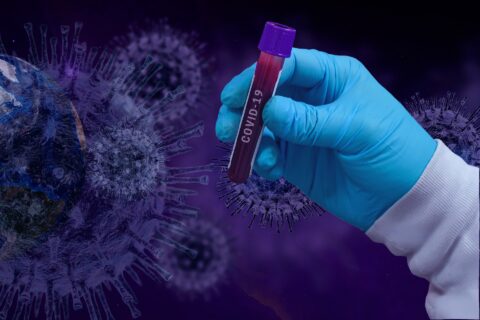
Advice on leprosy and COVID-19
Written by the ITC in conjunction with WHO (Available as PDF in English and French)
General comments
➢ The key preventive measures are handwashing with soap and water, and social distancing
➢ Follow your own government’s advice about travel, work and social gatherings
➢ Anyone with respiratory symptoms should stay at home and phone for health advice
➢ At present, there is no indication of any specific interaction between leprosy and COVID-19.
Diagnosis and clinical management of leprosy patients
➢ WHO recommends that community-based programmes and active case-finding activities be postponed until further notice; this includes contact tracing and chemoprophylaxis.
➢ Clinic-based patient care, including diagnosis and case management should continue, with careful attention to handwashing and the use of face-masks, by both health staff and patients. MDT supplies may be given for 2-3 months, to reduce attendance at the clinic.
➢ Non-urgent interventions such as reconstructive surgery can be postponed.
➢ Nerve function assessment should continue to be done every three months for patients on MDT, to reduce the risk of future disability. Treatment of reactions should continue.
➢ Steroids should be given to leprosy patients when indicated to treat neuritis. Steroids are immunosuppressive drugs, so may increase susceptibility to COVID-19, especially when used over several years for chronic diseases, such as rheumatoid arthritis. This effect is related to the dose and duration of the steroids given, so the typical 20-week course of prednisolone given in leprosy is considered safe. Anyone with a cough would normally be investigated for tuberculosis before starting steroids, so, similarly, steroid treatment may be delayed for 2-3 weeks in anyone with symptoms suggesting COVID-19. A few patients with ENL require steroids for a longer period; in these difficult cases, the benefit from the steroids will usually outweigh the small increase in the risk of acquiring COVID-19.
➢ If possible, contact patients on corticosteroid treatment by phone or through social media to ensure they are taking all possible precautions against COVID-19.
Public health aspects of leprosy in the COVID-19 pandemic
When epidemics or pandemics occur, poor people, including those affected by leprosy, are usually affected disproportionately. Measures that help to control a pandemic, such as movement restriction and closure of workplaces, generally have a serious negative impact on vulnerable groups. They can also cause social unrest and lead to loss of income for individuals and families.
➢ Special attention should be given to reaching vulnerable people when communicating measures advised by the government to mitigate the risk of COVID-19. An effort should be made to reach people affected by leprosy using multiple media channels such as mobile phone, radio, pamphlets and posters.
➢ Making clean water available is always important and especially now to ensure people can take appropriate preventive actions and take care of their sick relatives. Access to health services has to be guaranteed to the extent possible in an equitable manner.
➢ It is crucial that MDT stocks are properly managed, distribution of MDT continues and that MDT orders are placed on time.
➢ Avoid all non-urgent hospital consultations and admissions that can be postponed in facilities that attend to and admit COVID-19 patients to minimize the risk of leprosy patients becoming infected. Community- or home-based care would then be preferred.
Services for persons living with disabilities and/or psychosocial consequences of leprosy
Persons affected by leprosy, especially those with leprosy-related disabilities, may face stigma leading to social exclusion and poor mental well-being. Social exclusion often aggravates existing poverty, social inequalities and other vulnerabilities. A substantial proportion of persons affected suffer from common mental health conditions, such as depression and anxiety. Where such services are available, persons affected may be helped through socio-economic rehabilitation services, self-care or self-help groups, peer counselling and community mental health services. Often these involve meeting in groups and/or close, face-to-face contact with peers or care givers.
The key COVID-19 control measures like social distancing, self-isolation and prohibition to meet in groups directly interfere with the above services and interventions. This may directly affect the livelihood of persons affected, their ability to carry out effective prevention of disability activities and activities to work on building resilience and overcoming mental health problems. They may also increase social exclusion and loneliness, while fear of COVID-19 infection may add to anxiety and depression.
Recommended interventions to mitigate the above problems:
➢ Raise awareness among health workers, social services and public authorities concerning the psychosocial problems persons affected by leprosy may face and the ways COVID-19 control measures may aggravate such problems.
➢ Advocate with authorities to allow selected health and social workers, including peer counsellors, to visit persons with known problems due to disabilities, stigma, anxiety or depression.
➢ Try to ensure that a telephone helpline is available for persons affected to call when they face problems or just to talk and/or provide essential information about COVID-19 and ways to protect themselves from infection. Several countries already have a COVID-19 telephone helpline. Where this exists, the call centre staff should be made aware of the mental needs of vulnerable people including leprosy patients. Where leprosy-specific telephone helplines exist, those responding to the calls should know what advice to give with regard to COVID-19.
➢ Reach out to persons with known problems by telephone or SMS to let them know someone cares about their situation and to provide essential information about COVID-19 and ways to protect themselves from infection.
➢ Set up a social media platform, e.g. a Facebook or WhatsApp group where people can find information about leprosy and COVID-19 and where they can contact each other, or for peer
support. Such groups can also be used to provide essential information on how to protect oneself from being infected with the virus.
➢ Government and non-government organizations should facilitate access to social entitlements including pensions or the provision of basic food supplies, for persons with disabilities due to leprosy and other vulnerable groups, such as the elderly.